21 Most Famous and Delicious Kiwi Types and Varieties
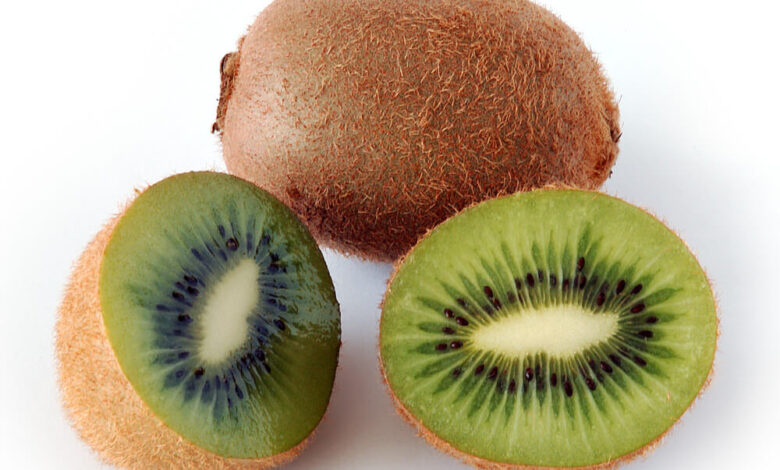
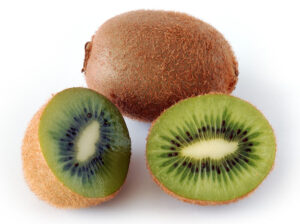 The origin of the Kiwi, technically known as Actinidia Deliciosa , is located in New Zealand.
The origin of the Kiwi, technically known as Actinidia Deliciosa , is located in New Zealand.
Belonging to the genus Actinidia, currently the best known cultivars around the world are Hayward and Bruno.
In China, in 1983, the so-called Guangxi Botanical Institute managed to classify and describe around 53 species, 5 varieties and 15 forms included in the genus Actinidia.
There are 3 major botanical varieties, which are: chinensis, hispida and setosa. In the cultivated forms, A. chinensis var. hispida. For the most part, the current varieties that are grown come from New Zealand lands, so it is considered that there are female and male varieties.
Kiwi female varieties are:
- Abott
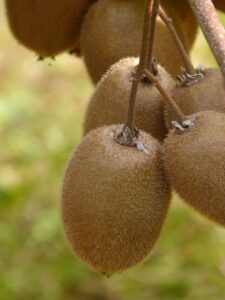 Bruno
Bruno- Hayward
- Monty
- Kramer
- Greensil
- Allison
- Vicent
- Tewi
- Gracie
- Jones
- Elmwood.
Male varieties are:
- Matua
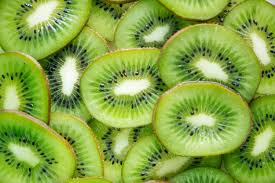 Tomuri
Tomuri- M-3
- M51
- M52
- M54
- M56
- Chieftain
- Autari
In Spain, Hayward-type kiwi cultivars are the most widespread, although some later introduced clones such as Hayward K, Hayward 8 and Top Star, collected in other countries. Among the types of Kiwi , there are 9 the best known are:
Green Kiwi
It is the most popular type of Kiwi in the world. High in vitamin C, it has a sweet taste with an exquisite acidity point. In some countries it is known under the name Kiwi Zespri.
Kiwi Hayward
It is a larger fruit , it has a hairy brown skin, with small hairs. Its green pulp is very juicy and has a durability of around 6 months if it is preserved well.
Kiwi Hayward Clone 8
It is a hybrid native to Greece, and its maturation process is faster than the others, having excellent resistance to low temperatures and winter frost.
Kiwi Top Star
It is medium in size, lacks hairs on the skin, even when it is a modification of the Hayward.
Summer Kiwi
It comes from several «controlled» crosses between various species. It has a much sweeter taste, less weight and a much faster harvest time that provides great economic benefits for its growers.
Kiwi Abbot
Medium in size, its conservation is less short than other types of kiwi.
Kiwi Bruno
It is one of the types of less commercial impact, it is much less popular. But it has higher amount of vitamin C, if it is compared with others.
Yellow Kiwi
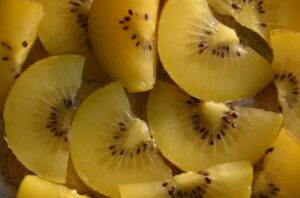 With the scientific name Actinidia Chinensis, it has a much sweeter fruit than the Green Kiwi type.
With the scientific name Actinidia Chinensis, it has a much sweeter fruit than the Green Kiwi type.
There is no characteristic acid touch in its flavor. And the pulp is deep yellow , not the usual green color. This species is the second most widely cultivated worldwide.
Kiwi Monty
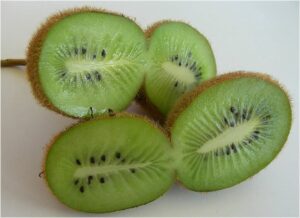 Despite the fact that its fruit is small, it does perfectly well with a sweet taste, much less acidic than usual.
Despite the fact that its fruit is small, it does perfectly well with a sweet taste, much less acidic than usual.
In addition, there is popular eties. Some of the best known are the following:
Abbot
Its fruit is medium in size, with a sweet acidic flavor and a very bright straw-green pulp.
Bruno
This medium-sized variety also has a very bright green pulp, very juicy, with a sugary and acid flavor at the same time.
Hayward
In this variety, the fruit is larger and more uniform, with a lighter green polish, although it is also very bright and has an acidic sweetish perfumed flavor.
Gracie
It has the peculiarity that the skin of the fruit is greenish-brown in color, with hairs. The pulp is very green, with a slightly acidic and fragrant flavor.
Jones
The fruits are oval in shape, with a fairly bright straw-green pulp and a slightly acidic and fragrant sugary flavor.
Monty
The fruit is not very uniform in size. The pulp is bright straw-green in color, with a sweet-sour taste.
Kiwi Hort 16
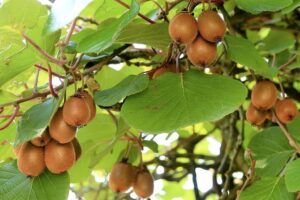 This medium-sized fruit is a variety that comes from the Yellow Kiwi.
This medium-sized fruit is a variety that comes from the Yellow Kiwi.
The pulp is also bright yellow in color and has high concentrations of vitamin C, E and iron , which makes this variant a powerful and very commercial food option.
Kiwi A 19
It is very similar to the Yellow Kiwi, worse with a substantial difference: the fruit is much smaller than its predecessor and is also more acidic. In New Zealand its cultivation became very popular.
Kiwi Jin Tao
It is closer to the Kiwi Hort, although it comes from the Yellow Kiwi. Therefore, its pulp is also yellow, but with a smaller and sweeter fruit.
Kiwi Sun Gold
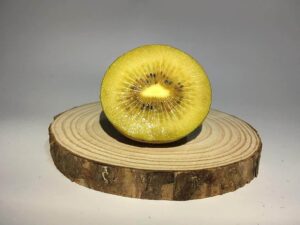 Another variant that comes from the Yellow Kiwi, with an acid flavor and a skin without hairs or hairs. It is widely cultivated in New Zealand.
Another variant that comes from the Yellow Kiwi, with an acid flavor and a skin without hairs or hairs. It is widely cultivated in New Zealand.
Kiwi JB Gold or Kiwi Kiss
This variant of the Yellow Kiwi also comes from, but it is larger. In New Zealand they cultivated it for the first time.
Kiwi Soreli
It is also derived from Yellow, resists low temperatures and its skin is smooth, it has no hairs. They grow it in Italy.

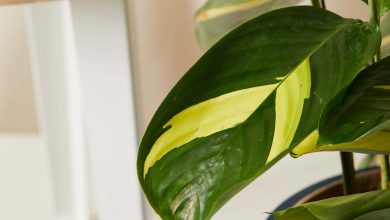
![Photo of Sprinkler Irrigation: [Advantages, Disadvantages, Forms and Operation]](https://www.complete-gardening.com/wp-content/uploads/2022/08/sprinkler-irrigation-advantages-disadvantages-forms-and-operation-390x220.jpg)

